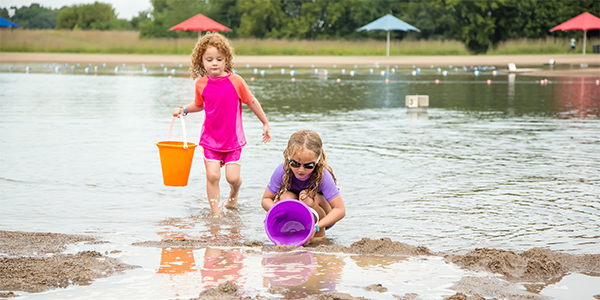Lake Anza in the summertime is full of people scooping water, swimming and splashing. It’s also full of little fish. Though you’d think they’d know better by now, and there’s the rest of the lake to swim in, they swirl around in the designated swimming area, temptingly underfoot. I’m watching my six year old as she wades through the water, scooping, missing, scooping, missing, her bucket coming up full of water. Around her other children are doing the same thing. No one catches a fish. The children excitedly chat with each other, discussing technique, pointing out the minnows, taking turns with buckets.
They laugh and scoop…nothing.
During a snack break I ask if I can try. My daughter loans me her bucket and with a bit of effort, there’s a silver flash and I’ve got one! I rush back to her, and for a moment children gather around to peek. Then they all go back to their snacks.
“Put her back,” my daughter says.
Surprised, I comment, “You’re already done looking? After all that work hunting?”
“Yeah,” she says.
I dump the fish back into the lake and it darts away.
After snacks are over, the children rush back into the water to begin fishing again. They race through the lake, dragging buckets, catching nothing. After watching them for some time, I ask my daughter, “Do you want me to catch you another fish?”
“No, I want to catch one,” she replies, rejoining the children in their efforts.
I go back to the sand and think about my efforts to “teach” my daughter to catch a fish and her wish to do it without me taking over the game.
She reminded me about a key message we cover at our laboratory school: give children time and space for open ended exploration and play.
I think about my daughter’s summer: music lessons and swim lessons, each with an adult coaching, showing the right way to do things. She listens, observes, imitates, practices. This is one way children and adults learn. But it is not the only way, and it is not the point of going to this lake.
At this lake no one cares if the adults can catch fish. No one really needs a fish.
When you have a fish, you dump it back. It’s not lesson time. Fish catching is about the thrill of the chase, the work with friends, the shared challenge. It’s about problem solving, observing how the fish move (science!) and motor skills too.
Having a fish that someone else caught isn’t the point. I think about being a parent and a teacher and observing children. Even experts can forget that there is a time to model and guide, and also a time to give space for the kind of learning that happens with uninterrupted play and exploration.
There are a lot of lessons to learn when wading with minnows!
Julia Luckenbill is the director of Davis Parent Nursery School’s Danbury site and an adult educator with the Davis Joint Unified School District. She is retired from her work as a full-time lecturer and program coordinator at the Center for Child and Family Studies Laboratory School and is enjoying afternoons with her daughter.
